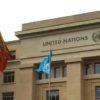Blog

Widow Burning: The Burning Issue of Colonial Britain and India
“Be it so. This burning of widows is your custom; prepare the funeral pile. But my nation has also a custom. When men burn women alive we hang them, and confiscate all their property. My carpenters shall therefore erect gibbets on which to hang all concerned when the widow is consumed. Let us all act…
Read more
“Was it not Harriet Beecher Stowe?” Some Thoughts on Cultural Appropriation from the Perspective of Nineteenth-Century Activism
Over the last fifteen years, there has been an upsurge in public interest for ‘cultural appropriation’, popularly understood as the adoption of distinctive elements of a culture by people who do not belong to that culture (see, for instance, James O. Young’s book on cultural appropriation and the arts). Rather than referring to a natural…
Read more
Public, Power and Play: Notes on doing ethnographic fieldwork in a contested neighbourhood in the Netherlands
When googling “Schilderswijk Den Haag”, it is this picture that comes up next to the Wikipedia description of the neighbourhood in the Dutch city of The Hague. The rhyme “Geen Jihad in de Straat” is translated as “No Jihad in the Street”. Public The picture was taken during a public protest in August 2014…
Read more
The Demolition of Sanjiang Church in China: When Law Meets Religion
In April 2014, Sanjiang Church, a Christian church in Wenzhou city in China, was demolished due to building codes violations. The church, its annex and parking lot covered more than 10,000 square metres, where as it only had permission for 1,881 square metres. The demolition by the Yongjia county government attracted much attention, and some Western media even…
Read more
Understanding the Role of NGOs in a State-centric Human Rights System
This October and November, I spent a fascinating month with the UN Committee responsible for monitoring States parties’ implementation of the Covenant on the Elimination of all forms of Discrimination Against Women (CEDAW). Essentially, this Committee of 23 independent experts meets three times a year in Geneva to assess the “report cards” of the 189…
Read more
“Here anyone could die…”: Prisons and Human Rights in Guatemala
The Guatemalan prison system collapsed and was abandoned by the Guatemalan state decades ago, according to experts and human rights activists. Currently the penal centers are facing a 300% overpopulation[1] and use additional police jails and military installations to accommodate inmates. In addition, prisons lack (adequate) medical care, alimentation and sleeping arrangements and have become…
Read more
Between the Paradigms: Youth Representatives and Local Governance in Timor-Leste
Simão[1] is twenty-seven years old, lives in Dili (the capital city) and his family comes from Viqueque, one of the three eastern-most districts of Timor-Leste (East Timor[2]). After finishing high school he participated in a few vocational trainings and so he learned a thing or two about computers and about construction. Then, in 2009, the…
Read more
Women converting to Islam in the Netherlands: ‘van Hagelslag naar Halal’
In public debates in contemporary Western Europe, religious traditions are often met with suspicion when it concerns the freedom of women. Monotheistic traditions (Judaism, Christianity and Islam) are in these debates often considered to pose a threat to ideals of equality and emancipation. At the same time, traditional religious groups increasingly foreground themselves as protectors…
Read more
Regeni and cosmopolitanism: the false question of national belonging
“Where are you from? – Italy.” “Ah, you have Regeni. We have thousands of Regeni in Syria.” At the beginning of the summer of 2016 I participated in a sit-in against the ongoing siege of the Syrian city of Darayya in the Hague. The sit-in was organized by Het Syrische Comitè (Lagnalida ҅am al-thawra al-suriyya fi Holanda),…
Read more
Duality or Complementarity? The Political and Legal Orientations of the Chinese Petitioning Mandate
On 14 September 2016, the Chinese State Bureau for Complaint Letters and Visits (“Bureau”) in Beijing saw 24 lawyers providing legal advice for the petitioners. This was the first experiment of the joint-program between the Ministry of Justice and the Bureau, which aims to resolve litigation-related petitions.[1] The Chinese Government established a guiding principle called…
Read more
